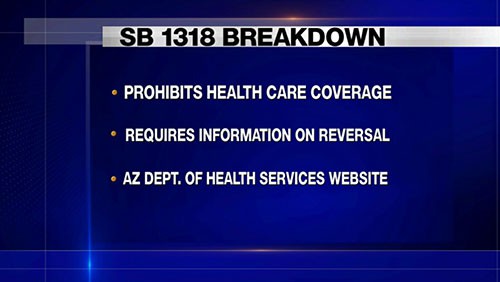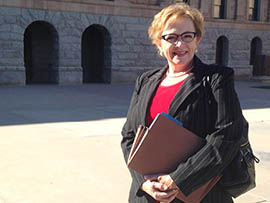Cronkite News has moved to a new home at cronkitenews.azpbs.org. Use this site to search archives from 2011 to May 2015. You can search the new site for current stories.
Proponent: Pending abortion law gives women essential information
Gov. Doug Ducey’s decision to sign legislation requiring physicians to tell those receiving medication abortions that the procedure may be reversible, a claim disputed by research, will provide women with essential information, a proponent said Tuesday.
“It ensures that if a woman who has had a (medication) abortion has changed her mind, she will be informed that the process can be reversed,” said Cathi Herrod, president of the Center for Arizona Policy, a conservative advocacy group that pressed for the change.
The bill Ducey signed Monday also would bar any health care exchange from providing coverage for abortions except in cases of rape and incest. Herrod said that change will protect taxpayers.
“Taxpayer money will not go toward subsidizing abortion coverage,” she said.
But Alessandra Soler, executive director of the Arizona Civil Liberties Union of Arizona, said federal law already prohibits the use of federal funds for abortion coverage and that the state law will violate the rights of consumers to purchase their own health care products.
“The state of Arizona is inserting itself into decisions consumers have to make,” she said. “They are doing this off of misinformation, and this rhetoric is not based on fact but extremist agenda.”
In a statement explaining his decision, Ducey said, “The American people overwhelmingly oppose taxpayer funding of abortions, and it’s no different in Arizona, where we have long-standing policy against subsidizing them with public dollars.”
Bryan Howard, president of Planned Parenthood Advocates of Arizona, said in a statement that Ducey has put Arizona in the national spotlight for interfering in the medical decisions of women.
“Instead of bringing people together around a common objective of reducing the number of abortions through prevention and education, Arizona is piling more onto a decade of women’s health restrictions that do nothing to reduce the need for abortion but instead create more hardship for Arizonans,” he said.
The law will require the Arizona Department of Health Services’ website to provide information on how to reverse a medication abortion.
Proponents of the change say that if a woman who takes mifepristone to terminate a pregnancy changes her mind, she can take the hormone progesterone to reverse the effects.
Jodi Liggett, director of public policy at Phoenix Planned Parenthood, said that procedure has never been subjected to peer review.
“This is a group of ardently pro-lifers across the country doing what is essentially experimental treatments on vulnerable women,” she said.
According to a report by the American Congress of Obstetricians and Gynecologists, claims of medical abortion reversal aren’t sufficiently supported by scientific evidence, nor are the methods recommended.
The report also said that progesterone can cause significant adverse reactions in the cardiovascular, nervous and endocrine systems.
Liggett said Planned Parenthood will try to blunt the impacts of this new law as well as explore every legal avenue.
“Expect a court case,” she said. “We will try to help our physicians who are required to give this information to script it in a way that shows they don’t believe in it or recommend it.”









